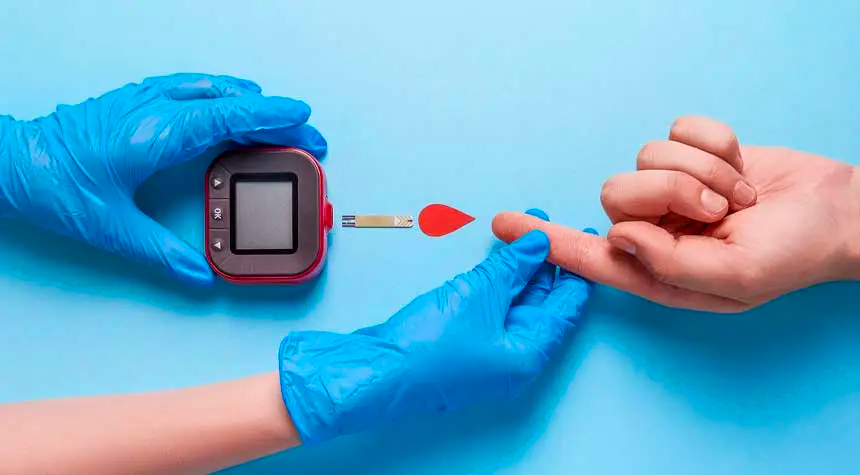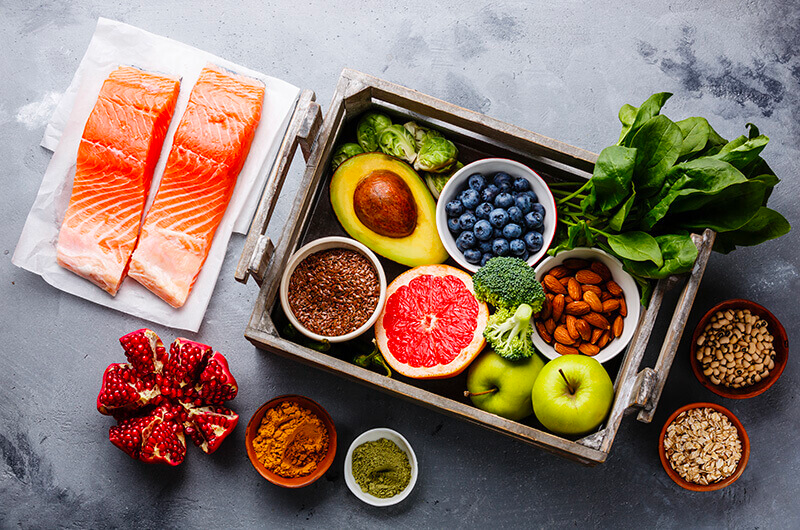
How Should I Eat If I Am Prediabetic?
Are you wondering how should I eat if I am prediabetic?
If you have prediabetes, you may be curious about how your diet can help manage your blood sugar levels.
Without a doubt, prediabetes rates are on the rise, and your diet and lifestyle habits have a direct correlation with the condition.
Whether you have recently been diagnosed or want to understand more about maintaining optimal blood-glucose levels, these dietary recommendations can lead you in the right direction!
Can you reverse prediabetes with diet and exercise? Find out in my full blog post on the topic!
What is Prediabetes?
Prediabetes is a health condition where your blood sugar levels are higher than usual but not high enough to be classified as type 2 diabetes.
Prediabetes is the stage before type 2 diabetes. Because of this, there is an increased risk of developing type 2 diabetes, heart disease, and stroke.
To be diagnosed with prediabetes, you have either:
- Fasting blood glucose level ranging somewhere between 100-125 mg/dL
- A glucose level of 140 to 199 mg/dL measured 2 hours after a 75-g oral glucose load
- Glycated hemoglobin level (HbA1C) of 5.7% to 6.4% or 6.0% to 6.4%
Prediabetes is a warning sign that individuals should start implementing healthier lifestyles, dietary choices, and activity levels to prevent any further progression of type 2 diabetes.
That being said, diet and physical activity are first-line treatments for prediabetes!
Understanding Prediabetes
More specifically, prediabetes is “impaired glucose metabolism,” meaning the body has difficulty regulating glucose (blood sugar) levels to stay in the normal blood sugar range (below 100 mg/dL).
Next, prediabetes occurs because of insulin resistance and dysfunction of specific cells in your pancreas since these components are responsible for blood sugar regulation.
So, what does this mean? Let’s break it down.
- Insulin Resistance: Insulin is a hormone produced by the pancreas that is responsible for the adequate regulation of blood glucose by absorbing glucose from the bloodstream. In prediabetes, cells in the body become less responsive to the effects of insulin, so large concentrations of glucose continue to stay in the bloodstream. Even more, insulin resistance leads to type 2 diabetes.
- Pancreatic Beta Cells: The pancreas contains cells called “pancreatic beta cells.” These cells are responsible for producing insulin. For example, if these beta cells do not function properly, there could be low insulin levels and heightened blood glucose levels.
Further, the combination of insulin resistance and beta cell issues can lead to prediabetes.
You may be wondering, what can lead to insulin resistance?
- Genetics: Insulin resistance can be genetic, making someone more susceptible to prediabetes from birth, even with healthy lifestyle habits.
- Physical Inactivity: Physical activity supports insulin sensitivity and glucose metabolism. A lack of physical activity is a significant risk factor for insulin resistance.
- Dietary Choices: Next, diets contributing to inflammation and obesity are risk factors for prediabetes. Food choices high in refined carbohydrates, sugars, saturated fats, high-fat meats, and processed foods can lead to insulin resistance. Further, the diet is a lifestyle intervention that plays a crucial role in prediabetes.
- Aging: Over time, insulin resistance naturally begins to occur. Other factors like diet and exercise status can progress this natural occurrence.
- Obesity: Obesity is a major risk factor for prediabetes, as excess fat correlates with insulin resistance. Fat, also called adipose tissue, releases adipokines, which can corrupt insulin’s glucose regulation.
How Should I Eat If I Am Prediabetic?

First off, healthy diet choices are crucial for managing prediabetes and reducing the risk of progressing to type 2 diabetes.
Here are some general dietary guidelines important for those with prediabetes:
Increase Intake of nutrient-dense foods like:
- Non-Starchy Vegetables
- Leafy greens
- Broccoli
- Cauliflower
- Brussels sprouts
- Bell peppers
- Cucumbers
- Tomatoes
- Whole Grains
- Quinoa
- Brown rice
- Oats
- Barley
- Lean Protein Sources
- Chicken, Turkey
- Fish
- Lean cuts of beef or pork
- Tofu and tempeh
- Legumes (lentils, chickpeas, and black beans)
- Healthy Fats
- Avocados
- Nuts & seeds
- Fish
- Fruit
- Dairy or dairy alternatives
- Skim or low-fat milk
- Soy milk
- Almond milk
- Water: continue to stay well-hydrated with non-sugar drinks like water, infused water, or herbal teas.
- Increase high-fiber foods
- Lentils
- Chia seeds
- Flax seeds
- Whole fruits and vegetables
Foods to limit with prediabetes:
- Refined carbohydrates
- White bread
- White rice
- Cereals
- Pastries
- Sugary foods and beverages
- Soda
- Candy
- Processed and pre-packaged foods
- High-fat meats: high-fat meats are generally high in added sugars, refined carbohydrates, sodium, and saturated fats.
- Packaged snack foods
- Fast-food meals
- Instant noodles or pre-packaged noodles
- Sugary beverages
- Excessive alcohol intake
Furthermore, keeping track of what works best for you is essential, too!
How Do I Prevent Blood Sugar Spikes?
Here are a few dietary tips that may help monitor glucose spikes:
Dietitian Tip #1:
Skipping meals may cause unstable blood-glucose levels.
Stay on a semi-structured eating pattern to support regular eating habits for blood sugar control. This schedule can be personal and unique to you. Additionally, keeping a food journal can allow you to create the best meal schedule for you!
Dietitian Tip #2:
Portion control can aid in regulating blood sugar levels by being mindful of how much food you eat during meals or snacking.
If you want to control portions, it is crucial to be mindful of hunger cues, have balanced portion sizes, and decrease overeating.
Even further, overeating can cause immense glucose spikes, leading to even greater insulin sensitivity or more complicated health concerns.
Avoiding distractions while eating can help you to stay more mindful of feelings of fullness or satiety.
Professional Support for Managing Prediabetes

Having personalized care from a healthcare professional can make a massive difference in blood-glucose management!
Primary care physicians and registered dietitians help those with prediabetes find the best plan in prediabetes care.
In addition, meal plans, lifestyle modification goals like diet and exercise habits, and medications are some examples of how healthcare professionals can support those with prediabetes.
Have more questions about prediabetes, prevention, and access to nutrition support?
Head over to my services page to learn more about my 1:1 premium nutrition services with an expert diabetes dietitian to make prediabetes management less stressful!
Lastly, your visit may be 100% covered by your insurance. That’s right- you can see me for little to no payment on your part. Find out more here!
How Should I Eat If I Am Prediabetic: Takeaways
Overall, lifestyle modifications, including keeping a healthy diet, having regular exercise, and appropriate weight management techniques as needed, are crucial for preventing and managing insulin resistance.
I hope this article answers your question about how should I eat if I am prediabetic.
For someone with prediabetes, whole grains, non-starchy vegetables, whole fruits, healthy fats, lean proteins, fish, and legumes are great dietary choices for blood-sugar maintenance and care.
Remember, food is medicine! Working with a healthcare professional such as a registered dietitian near you can ensure optimal strategies are being implemented for unique and personal care.
All in all, prediabetes is absolutely manageable with support and personal dedication to healthier lifestyle habits.
